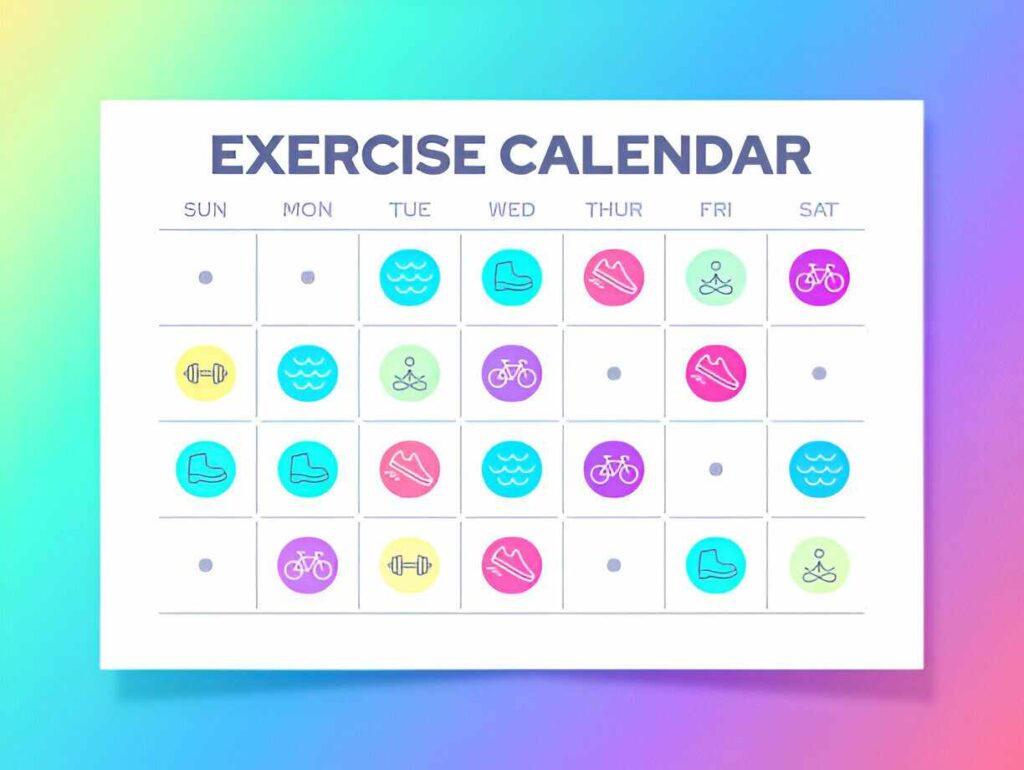Running is fabulous exercise. It brings a lot of benefits on a physical and psychologically minimum level. Whether you’re an experienced marathon runner or a newcomer who is just about to take your very first steps, knowing how often you should run is crucial. This can help with the optimization of your training to ensure that your running goals are met. How often one runs affects progress.
It also impacts your performance and injury prevention. This is an all-inclusive guide. We have to talk about the recommended running cadence. We shall also cover some things to consider when making your running schedule. We shall cover how to set realistic running goals. So lace up your running shoes and get ready to take your running to another level!
Check Out Your Level of Fitness and Goals
You want to be fit; so know where you are. You also want a clear view of where you want to be. First, therefore, assess your fitness level. Based on that, set goals. This is a key step in your fitness journey.
What is going to help the better runners out there is knowing where they stand. Consider your overall endurance, speed, and cardio. Knowing your level of fitness will let you come up with an optimum running schedule tailored to you.
The answer to creating an ideal running routine is balance. You need to balance that perfect blend of challenge and progress in running. Realistic goals are where to start: ones that are going to push you hard, but ones that are attainable, be it running farther a little at a time or working toward shaving a few seconds off your mile time. Be sure to track your progress along the way to stay motivated. It will also help to keep adjusting the routine.
Remember that everyone is different, and what works for someone else won’t work for you. Be easy on yourself and be prepared to change course should that need arise. Determine your current level of fitness. Determine appropriate goals. There’s a base for a successful fitness journey.
Understanding Rest Days
Fitness enthusiasts normally give less importance to rest days. They want to train hard, push limits. But here is the time for understanding the role that rest days play. These represent an integral component of a healthy workout. Not only are rest days important for allowing the body to physically recover, but they also prevent injuries and boost performance.
To be certain, most starter joggers, advanced included, tend to wonder how often they should run. Sometimes getting the right balance between run days and rest days brings the best answer. You are supposed to challenge yourself and yearn for progress. Overtraining is dangerous for your health and progress. Thus, rest days in your running schedule are aimed at letting the body repair and strengthen itself. They cut injury risk.
Rest days let muscles recover. They get rest from the stress of running. The body is replenishing tissues which might have been torn and refilling the lost energy in these days. This, in addition, is important for avoiding mental burnout. Breaks from running allow the mind to rest. This will keep you motivated for your subsequent trainings. You need to listen to your body. Give it the rest it requires. This way, you will not be overworking yourself and will be fit enough to give your best performance.
Conclusion: Do not undermine the role of rest days in your running schedule. It’s not a sign of weakness or laziness but is, in a way, being smart about how to treat your body according to its needs. Rest is the most important ingredient in any fitness program that is executed well. So next time you lace those running shoes, make sure to schedule the rest days, too. Let your body recover and heal. Your body and mind, naturally, will thank you for this great amount of care, and you will reach your running goals way more efficiently.

Design a Custom Running Schedule
If you’re a runner, then you understand what a great running schedule means. Having a personalized running schedule is like having a guide on your key progress. What is more, a running plan keeps you motivated yet safe from overexertion. But how do you know how much running is right for balance? The answer mostly depends on your current level of fitness, goals, and general health.
Running Frequency for Beginners
For beginners, an initial frequency of three to four times a week is recommended. This premise allows the body to adapt to the demands of running without overstressing joints and muscles. You can gradually increase the number of running days once you have developed further in running and find it comfortable. However, you genuinely need to listen to your body and allow recovery time before repeating any type of workout.
Running Frequency for Intermediates or Advanced Runners
Intermediate and advanced runners usually aim to run five to six times a week. They log some combination of easy runs, interval training, speed work, and long runs. This frequency builds endurance. It allows focused training in operation to help achieve its goals. These goals include improving race times or increasing mileage.
Importance of Rest and Recovery
One should also consider the quality of running as much as the quantity. This will help the body to recover and not be burned out. On your rest days, engage in cross-training or active recovery. They will enhance other components of your fitness, giving your running muscles a break.
Personalizing Your Schedule
How often you should run depends both on your fitness level and running goals. A beginner would start running three to four times a week, building on that as the body gets stronger and more conditioned. Then, someone who has built up a middle or high level may train five to six times every week, but one still needs rest for recovery. Besides, this prevents overtraining and eventually an injury. A personalized running schedule makes all the difference in finding that balance. It spares you the burnout but allows one to enjoy the benefits accruing from running.
Balancing Frequency with Intensity
Few issues are more common among fitness enthusiasts. They have to manage a balance between the frequency and the intensity of the workout. Are you an occasional runner or a skillful athlete? How often should you run? Knowing this will keep you on track toward your goals and ensure that you’re not Court end up injured or burning out.
Determining Running Frequency
The frequency of running is not a one-size-fits-all approach; it depends on lots of factors. These include your level of fitness, training goals, and general health. For a beginner, it should be easy to start with three to four runs per week. This provides adequate time for recovery after a run. Seasoned runners may increase the frequency of their running to four to six runs a week.
Managing Run Intensity
Equally important is the intensity at which you make a run. This includes the effort that is put in every run. Further, it can be measured against some things like pace, heart rate, or simply perceived exertion. Balancing frequency and intensity puts you at a threshold of where it’s challenging but not stressful. This keeps easy, moderate, and hard runs mixed in, thus keeping one away from plateaus and straining of muscles.
Importance of Rest and Recovery
It’s Also Important to Rest Regularly The rest days are as vital to preventing injury and making progress as the running days themselves. Take a day off, or do an easy session of yoga or a swim. It will let your body recover and rebuild itself. It’s about tuning in to the signals your body is giving you and finding the right balance that works for you.
Make it Personal
Ultimately, how often and how hard to run is a personal balancing act, and constantly evolving on your way there. Try different schedules. Listen to your body. Find the routine that motivates and challenges you. But it should not exhaust you. Remember, consistency, patience, and personalization are key in not just reaching running goals but also in keeping a body aged, satisfied, and healthy.

Factors to Consider when Determining the Frequency of Your Runs
How often one should run is a question that will always come up in the mind of any runner. It doesn’t matter whether you’re a new runner or a veteran athlete, as this is always applicable. There isn’t any single answer that would apply to everybody. But there are several factors that help in determining how often one should run.
First and foremost, consider your level of fitness and running experience. For people at the beginning stages, this would be lower in order to allow the body some time to get accustomed to running as a rigorous activity. As one progresses and builds up endurance, he is able to increase the number of runs per week. In the case of experienced runners, they are able to easily cope with high frequency; however, that will depend on their goals and current condition.
Another factor would be the type of training one wants to attain. If one is training for an event or a race, then more runs per week may be indicated. If one simply runs for fitness or stress relief, a lower frequency might be adequate.
Also, consider how good you are at recovering and your history of injury. Running puts a lot of stress on the muscles, joints, and connective tissues. Therefore, allow sufficient time to recover. You often get hurt or sore. So it’s run less and add some easier exercises into the mix.
Ultimately, what makes up an ideal running frequency will vary from one person to another. The most important thing is to know how to heed your body and watch out for overtraining or burnout. One may also consult a doctor or running coach to offer advice on how frequently to run based on individual needs.
Modifying Your System for Running for Various Purposes
For any fitness enthusiast, a change in routine is essential. Be it running marathons or simply feeling more fit; the routine must incorporate variety. People often ask, “How often should you run?” The answer lies individually, with goals and preferences.
To be able to develop endurance and stamina, runners need to set up a routine. That routine has to be at a moderate intensity, meaning running three to five times a week, where the mileage increases overtime because the body needs time to get used to it and build such endurance and not overexert it. However, it is also important to listen to one’s body. Give yourself enough days off to avoid injury or prevent burnout.
But if speed and performance are what you’re really after, what you need is a far more rigorous training program. This may entail interval training, tempo runs, or even hill sprints. Such exercises can be very demanding. They’re best done in your routine only two to three times per week, this allowing ample time for recovery and repairs in muscles.
It adds quite a bit for runners who go for a more balanced approach toward fitness. Cycling, swimming, strength training—these all enhance fitness while keeping the risk of running-related overuse injuries at bay. Besides, it makes things interesting. Your personal preference and cross-training frequency will determine how often you could run.
Ultimately, it becomes a question of varying your training routine. Finding that balance is quite the point. Keep in your mind what you want to achieve, but make sure to listen to your body. Do not be afraid of new methods of training. No matter how hard you run, keep a time for rest and recovery; this is important for the best results and not getting burned out. It is not about the running frequency but about how well you are able to tailor your routine as per your needs.
Listening to Your Body and Adjusting as Needed

One of the key things is to listen to your body. It is a means to stay both physically and mentally fit. In workout activities, it will be more special. You need to listen to the signals given by your body. You must then change accordingly in your routine. For instance, you will know how frequently you can run.
Everyone is different, and as such, the frequency of run may differ from one person to another. Some people benefit from daily running. There are some athletes who require more days off from their routines. Paying attention to your body entails being aware of any body signals that express tiredness, aches, or general exhaustion. It is possible to take yourself too seriously and develop an injury in which case you will definitely not achieve your goals. You will not maximize your goals if you also ignore your body’s needs.
First, evaluate your level of physical fitness and set your goals. Are you training to run an event or just run for general fitness? It could be that consulting a fitness professional or an athlete coach may help in providing you with a personally-tailored plan for this. Also, remember to integrate rest days off in your routine. These allow the body to recover and rebuild. Note that rest need not be a sign of weakness; rather, it is an important constituent part of any training regime.
Ultimately, listen to your body and scale back your running schedule whenever you need to. If you find that you are consistently tired or dealing with pain following your runs, this might be a red flag that says you are running too much or perhaps too hard. On the flip side, if you are feeling energized and producing results, you actually can bump up your mileage or frequency. It is all about finding a balance. The balance lets you push yourself but not overexert. Finally, it comes down to keeping self-awareness. Making some changes to an exercise routine based on awareness is going to bring about a healthier run. It would be much more sustainable, too.
Adding Cross-Training to Your Running Plan
When it comes to running, it’s easy to get caught up in the grind of putting in miles day after day. But let’s be real: Adding some cross-training into your running plan can really enhance how well you perform. Cross-training is working on different kinds of exercise. These can include cycling, swimming, strength training, and more.
One added benefit of cross-training is its overuse injury prevention aid. Running puts a lot of stress on the muscular and skeletal systems of the body. The same activity each day could very well bring about imbalance and overuse injuries. With the addition of cross-training activities, the different muscle groups will be targeted. In a way, you’re giving your body a rest from this pounding of running. This will also help in maintaining your level of fitness.
So, how often should you consider adding cross-training into your running program? That depends on a few factors. They include your current level of fitness, the set objectives or goals, and the schedule. Incorporate activities on 1-2 times a week as this will increase your chances of health by improving heart health and allowing your body rest from running.
Finally, remember: cross-training should supplement your running, not replace it. Running is, after all, the number one activity that will make a person a better runner. It should at least be the focus of the training plan. Do cross-training to supplement and improve the running workouts, not to replace them. Learn to listen to your body. If you are tired or hurting, it may be your body’s way of telling you to run less and cross-train more.
There are many advantages to adding some form of cross-training into your running program. It prevents injuries and offers better overall fitness. The balancing of running with some form of cross-training can help one to be not only a strong runner but a well-rounded one. So, lace up those running shoes and get ready to mix things up with a little cross-training. Your body will thank you!
Setting Realistic Goals and Expectations

Setting realistic expectations and goals is the key to success in whatever area of life. One is chasing new fitness routines and working on career milestones; one needs to realize and understand what’s possible within a certain period of time. In the context of fitness, especially running, the main question is always, “How often should one run?”
It all depends on your level of fitness, goals, and schedule. Never forget to respect your body and not allow your eagerness to get the better of you, making you do more than you can handle. In that case, if you’re a total beginner, it is best that you run for some days every week. Afterwards, increase the frequency and time in your runs as your stamina and endurance develop.
Setting realizable goals is also important when it comes to running. Do not expect to be able to run a marathon some weeks from now. Begin with smaller goals, such as running a 5K or speeding up your running pace by some percent. It means that the breaking of the big goal down into smaller targets helps you track progress. It also keeps one motivated.
Ultimately, it is about finding a balance that works for you. Logically, some level of consistency is needed to be able to run, but the off days are just as crucial because your body needs rest time. Create realistic expectations and goals so that you don’t burn yourself out and get hurt. That way, you will have a much greater chance of success with running in the long term. Weddle up into your shoes and create achievable goals; then enjoy the journey toward a heal.
Professional Guidance and Support
The world today is fast and competitive. Getting professional guidance and support becomes quite imperative in today’s context. This holds true in the context of our personal life and our careers. Having that someone who can give expert advice and guidance can really bring about a sea of difference.
Health and Fitness Guidance
One area in which professional guidance is often sought out is health and fitness. Among the many pieces of conflicting information out there, it’s tough to know the way towards reaching our fitness goals. Professional guiding comes to our rescue here.
How Often Should You Run?
Depending on one’s fitness goals, questions often arise like “How often should you run?” The answer obviously isn’t going to be the same for everyone. A professional, however, would help you find your best frequency by assessing factors such as your current level of fitness, your goals, and general health. A pro can assess these factors and give you a plan that fits your needs.
Keeping Motivated and Accountable
Moreover, professional support can serve as a means of motivation and accountability. Let’s be honest here: fitness routines are not easy. Having a professional at your back can really give you that shove and boost of motivation that gets you going in the first place. They can help you set realistic, reachable goals and keep tabs on your progress, making any changes as needed. This support can make all the difference during your journey to fitness.
Preventing Injuries and Exercise Safety
Finally, professional help may be required if one is not sure how to safeguard themselves. Also, it can ensure you are physically fit. Most people start working out without proper directions. This results in avoidable injuries and sometimes setbacks. Seeking a pro’s advice can give you the right form, technique while working out, and know exactly how to avoid injury. Thereafter, you will work out to the best of your ability and achieve good results.
Final Words
You don’t focus on the mind alone when improving yourself; you have to make sure the body is in perfect shape, too. It’s running that does both. Running has loads of great benefits both to the BODY and the MIND. How often should you run?
How often one runs depends on the individual and other factors. For beginners, it can be three to four times a week. They can then gradually increase their runs per week as their endurance improves. Advanced runners can run five to six times a week. They allow themselves time to recover. But recovery is an individual thing, too. Go easy. Overexertion leads to injuries.
Now, aside from the frequency, there are equally important subtleties of your runs in duration and intensity. The duration of a run must be short for beginners. You should have a comfortable pace so that you can endure the workouts. These types of runs generate stamina for one. As one continues to train, they are able to add up some complex exercises like interval training or speed workouts. This will get them fit towards their desires. One is supposed to strike a balance. You must train well to avoid burnout and plateauing.
Ultimately, the correct running schedule is the one that suits your personality and preferences. You might run to mend your minds, shred some pounds, or because it makes you happy. Most importantly, though, put consistency at the top. Again, listen to your body and enjoy the process every step of the way. After all, running is a journey of self-discovery, resilience, and growth. Lace up, hit the road, and let the last words be an ode to your determination and perseverance.








